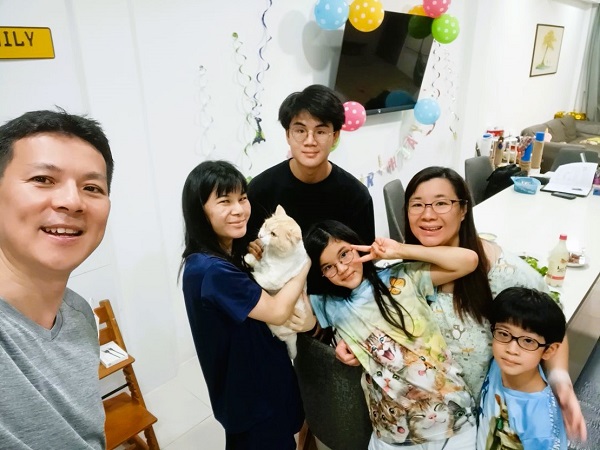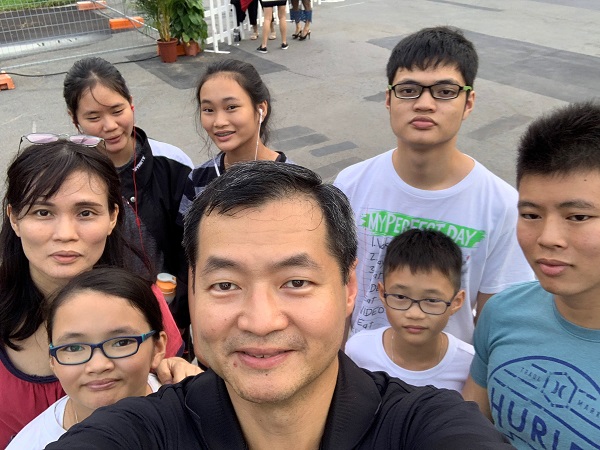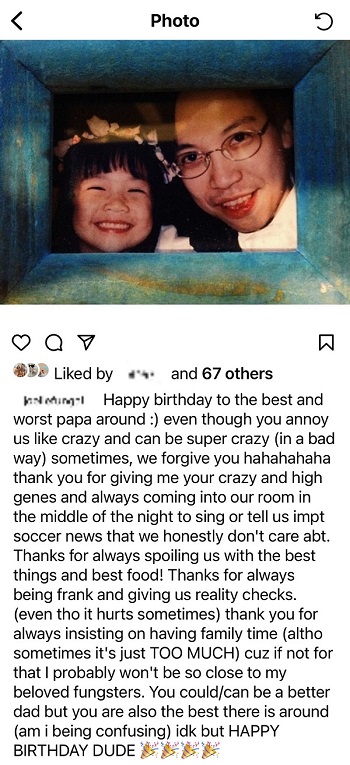Working parents must juggle the commitments of both family and career. For healthcare professionals busy with calls and rounds, this can be an especially great challenge. In this article, four doctors regale us with their various tales as working parents. From their initial worries as first-time parents to their pearls of wisdom as experienced parents (and grandparents), these doctors share the myriad ways they bond with their beloved children.
Adrian Loh
I enjoyed two decades post-graduation practising psychiatry and aviation medicine in the Singapore Armed Forces (SAF) Medical Corps before transiting into my current psychiatrist role in the private sector. My wife and I have four children, ages ranging from seven to 19. Like the Olympics, a baby came every fourth year; also like the Olympics, it was hard work each time getting myself re-certified in Infant Care 101, from burping to diaper changing.
My wife's first pregnancy came during my first year as an SAF regular medical officer. I was deployed to Timor-Leste over her second and third trimesters, and I was so anxious that I even requested for airline assistance when my wife flew over to meet me during my "R&R" (military slang for rest and recuperation) period! Our imaginary worries as first-time parents became real though, when our newborn was diagnosed with cyanotic congenital heart disease – thankfully, this was corrected expertly by Dr Sriram Shankar and his then KKH team. At work, my bosses and colleagues gave me ample time off, even facilitating a one-year delay for my UK aviation medicine course. This experience taught me first-hand the critical roles employers play in helping families thrive.
Our second and third children came around the time of my psychiatry Basic Specialist Training and Advanced Specialist Training programmes, respectively. The challenge then was to balance family needs with work, night calls, tutorials, examinations, etc. Fortunately, my wife was a "work-at-home" mother who ran a home-based preschool – she also home-schooled my kids in their early years. As for Daddy's role? I tried to make bath times fun, compose silly songs, rush home for dinners and squeeze in the obligatory zoo (and later, River Safari) visits. Daddy-kiddie bonding was helped by falling asleep with my brood (we shared two queen-sized mattresses) – I would wake up one to two hours later to finish some work and spend time with my missus. In recent years, this so-called "biphasic sleep" has also allowed me to hang out with our night owl teens!
Vacations are something we try really hard to make time for, as they create precious moments together for a growing family. They are costly though – not just monetarily, but emotionally and mentally in the exhausting pre- and post-vacation overwork! Although I store and share holiday pictures online, I have made it a point to print out albums for undistracted "reminiscence therapy".
As a child and adolescent psychiatrist, I thank my kids for being my "learning journey" in the first six of Erikson's eight stages of development! Having a bigger family is a blessing and besides the enjoyment we share, it has helped us grow in our Christian faith by presenting endless new challenges.
At times, I wonder whether we will adjust well to the empty nest when the time comes. While we have no fifth kid, we have been blessed with an affectionate cat. Adopted only last year, our "furkid" faithfully followed the family tradition of being four years younger again!

Getting the kids and furkid to cooperate with a wefie is hard work for Daddy!
Gamaliel Tan
In a 2020 Singapore population census, the percentage of working couples (both parents working) increased from 47.1% in 2010 to 52.5% in 2020.1 More wives have been entering the workforce in the last ten years and with the increasing costs of housing, transport and childcare services, a dual income family helps.
Large families are rare in Singapore, and the nation's total fertility rate was only 1.05 in 2022.2 Bringing up six children is not an easy task, and our initial years were tough, as career and childcare obligations were always competing for attention.
My wife Joanna and I met at school and graduated from NUS Yong Loo Lin School of Medicine in 1995. We got married in 1997 and had our first child in 1998 and our sixth child in 2009. Our fifth child was born in Toronto, Canada when I was doing my spine surgery fellowship in Toronto Western Hospital in 2007. At times, we felt we were really in over our head, but we found refuge in our faith. We went through our children's adolescent angst and frustrations, and their struggles with schoolwork and relationships. There were many times we were forced to acknowledge our human limits and rely on the help of others and place things in the hands of God.
Here are some factors that helped us:
- We got married at the young age of 26. At that time, we were both second-year medical officers with medical school debts to pay off and no HDB flat to call our own, but marrying so early conferred several advantages for us. Our youth afforded us fertility and energy to juggle work and the demands of child-rearing. We were young and had a can-do attitude. We did not overthink things to the point of paralysis (eg, how are we going to afford another child, how will we find more time to spend with them, etc).
- We stayed at my mother's house and had a good helper. Our current helper has been with us since 2007. We only moved to our own place shortly after the birth of our sixth child in 2010.
- Joanna transitioned to part-time work with the birth of our third child in 2003, which allowed her to focus more on our children's education and upbringing.
- We did not plan excessively but placed our trust and faith in God. We had to let go of things knowing we could only do so much.
Looking back over these 26 years, we do not regret our decision to have a large family. In fact, we are grateful for our family. With each child moving out for college studies, the home has been getting quieter. This makes Christmas all the more joyful when they are back for the holidays.
Our hope and prayer is that our children and the youth of Singapore will be able to find in them the generosity to love and bring up children of their own, despite the bleak picture the news tends to portray of the state of our world.

Outing to Marina Bay, 2018
Daniel Fung
I still remember my wife pointing to a billboard of a beautiful baby girl in a shopping mall weeks before we were married. This was in 1992 and I was a wide-eyed, wild-haired young man trying to keep his eyes open post-call. Fast-forward to the turn of the millennium, in 2001, my wife and I were flying 15,000 km home to Singapore with five young children and 19 bags in tow after the completion of my Health Manpower Development Plan fellowship in Toronto, Canada. We started out planning to have children as all couples do, though we did not plan for all five; they came along in fun and sometimes mysterious ways. Here are five things I wish I knew about parenting then that I know now:
Show love
Expressing love and affection is essential for building a healthy bond between parent and child. When my kids were young, they were surrounded by a large caregiving community of grandparents, aunts and uncles, and friends who hugged, cuddled and used positive words to show love and make them feel loved. This helps to create a nurturing environment that promotes their well-being.
Establish routines
Consistent routines help create a sense of security for children. We insisted on set daily activities such as fixed mealtimes. I made sure that whenever I was home for meals we would all eat together, and these meals would also happen with the extended family on a weekly basis. I believe that such routines help children to feel safe and secure, and it also teaches them self-discipline and responsibility.
Listen actively
Open communication is crucial for maintaining a healthy relationship with your child. We often try to spend time with our children during meals and activities. I would write them messages and letters to encourage them to express their thoughts, feelings and concerns, and I would listen actively without judgement. It is important to offer guidance and support when needed and be open to receiving feedback from your child as well.
Set boundaries and consequences
Establish clear and age-appropriate boundaries for your child to help them understand what is expected of them and the consequences of not following the rules. I gave our children a set allowance of $10 a week, and when they reached university age, I gave them a credit card with preset limits. This enabled me to monitor their spending and teach them practical financial literacy. Consequently, they learnt responsibilities control and the importance of respecting rules.
Encourage independence
Allow your child to make choices, take on responsibilities and learn from their mistakes. We try not to overly protect our children, and we allow regular failure in their sports and academics. We did not sign our children up for tuition unless they asked for it, and a few did when they were in junior college. Developing problem-solving skills will prepare them for greater independence and decision-making abilities as they grow older.

My daughter Joelle's letter to me on my birthday
Damian Png and Gladys Wong
We are the Pngs!
Damian is a urologist in private practice and Gladys (Glad for short) is a GP. We have seven children (ages ranging from 18 to 31), a rarity in Singapore, but we always knew we would have a large family. Damian wanted six kids and Glad really wanted a daughter. As life and God ordained, the girls came to us at children number six and seven.
Glad: Early in our marriage, we had to make decisions concerning our work-life balance. Damian was really passionate about his career pursuing urology, and I made the choice to give up anaesthesia traineeship, especially since Damian was convinced I would struggle with the physics involved. Being a GP allowed for more flexible hours especially since my practice partner, Sarani, was also a mother; it was easy to have an alternate day working schedule. This enabled me to spend quality time with my young and demanding family and still have a clinical practice.
Damian: We also had the advantage of a three-tier family arrangement with in-house grandparents and supportive in-laws. The running of the household and planning of meals was handled by my mother, leaving us free to enjoy time with the kids and drill them in their studies as necessary. We were also blessed with having domestic helpers who were genuinely fond of kids.
Our family time
Glad: Effort and sacrifices were made to spend time together as a family. I remember bringing the kids and supper to Damian when he was on call at National University Hospital and having the kids tag along on Sunday rounds.
Damian: To maximize our family time, we involved the kids in the areas important to us. Music is central to our family life and the kids were all exposed to different genres and instruments. Post-dinner recreation usually involved belting out retro hits (Beatles, Beach Boys, Queen, etc) and jazz standards. Our kids developed an appreciation for music from our era. In turn, we were introduced to their music (Coldplay, Adele, etc).
Glad: The love language in the Png family is food! Damian is Peranakan and I am Cantonese; the coming together of these cuisines results in an explosion of flavours (Damian does not cook but his mum does). A weekend at home typically involves the older kids cooking and trying out recipes. We usually select a cuisine theme (Korean, Japanese, Szechuan, Thai, French, etc). Our kids are encouraged to bring friends and partners home to interact with us through meals and conversations. Our kids also meet our friends and learn from their life experiences.
Damian: Our Roman Catholic faith is the foundation of our marriage and family. We had always been part of a church choir and the children were also integrated into this. Over the years, the choir evolved into our kampung of young and growing families supporting each other, be it via carpooling, childminding or exchanging childcare information. The fruit of these 30-plus years of community is that our kids now have a close-knit Christian community with choir kids and they have now formed their own choir.
Another area we are engaged in as a family is mission work. We are all active in ACTS Singapore, a Catholic humanitarian family-based mission organisation. We have engaged in missions as a family since 2011, and the interactions and increased awareness have helped to mould and shape our kids and our family.
Closing thoughts
Damian: Medicine is a noble and inspirational profession. Our children grew up listening to Glad and I sharing our experiences in medical practice, and three of our seven kids have opted to follow this path.
Glad: They also grew up with a Manchester United (ManU) fan, but life is full of choices and Damian counts only one ManU fan among the kids. Premier League nights are rowdy affairs in the Png household.
Damian: Of course, sacrifices have to be made as time and resources are finite, but we have managed to enjoy our occupations and our family, and still remain relatively sane in the process.

Family picture